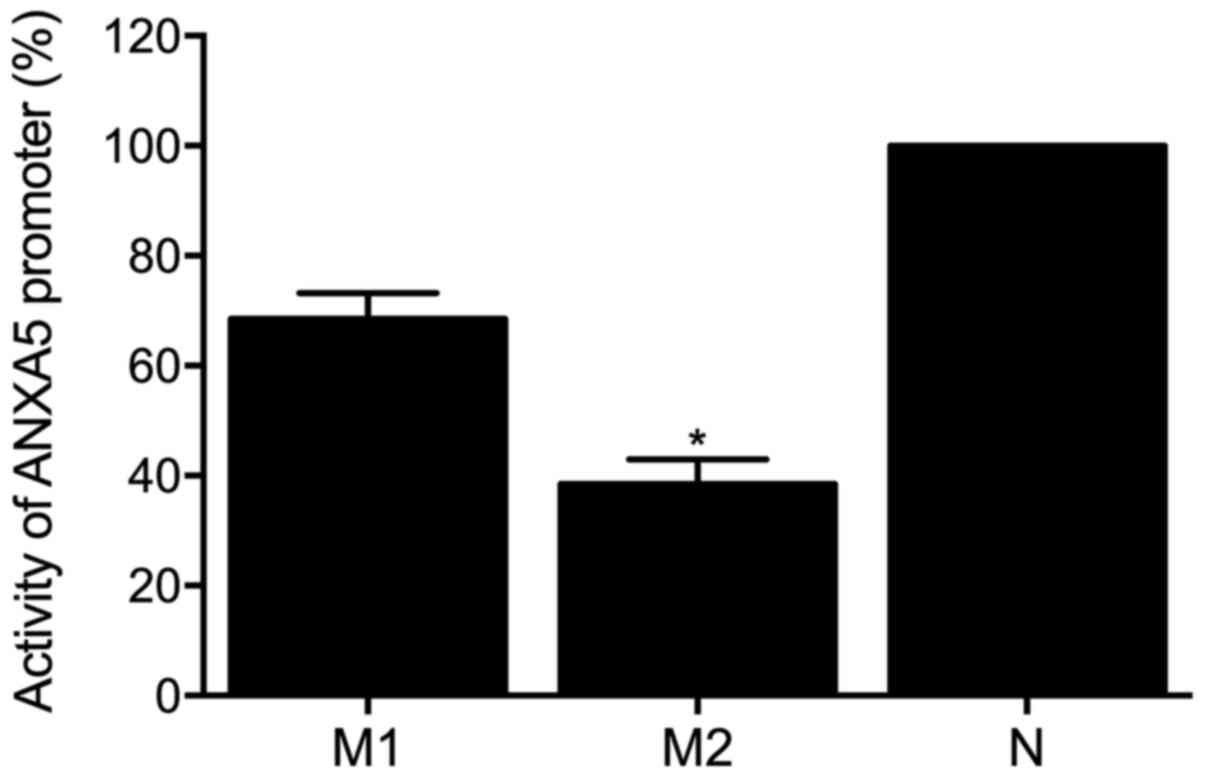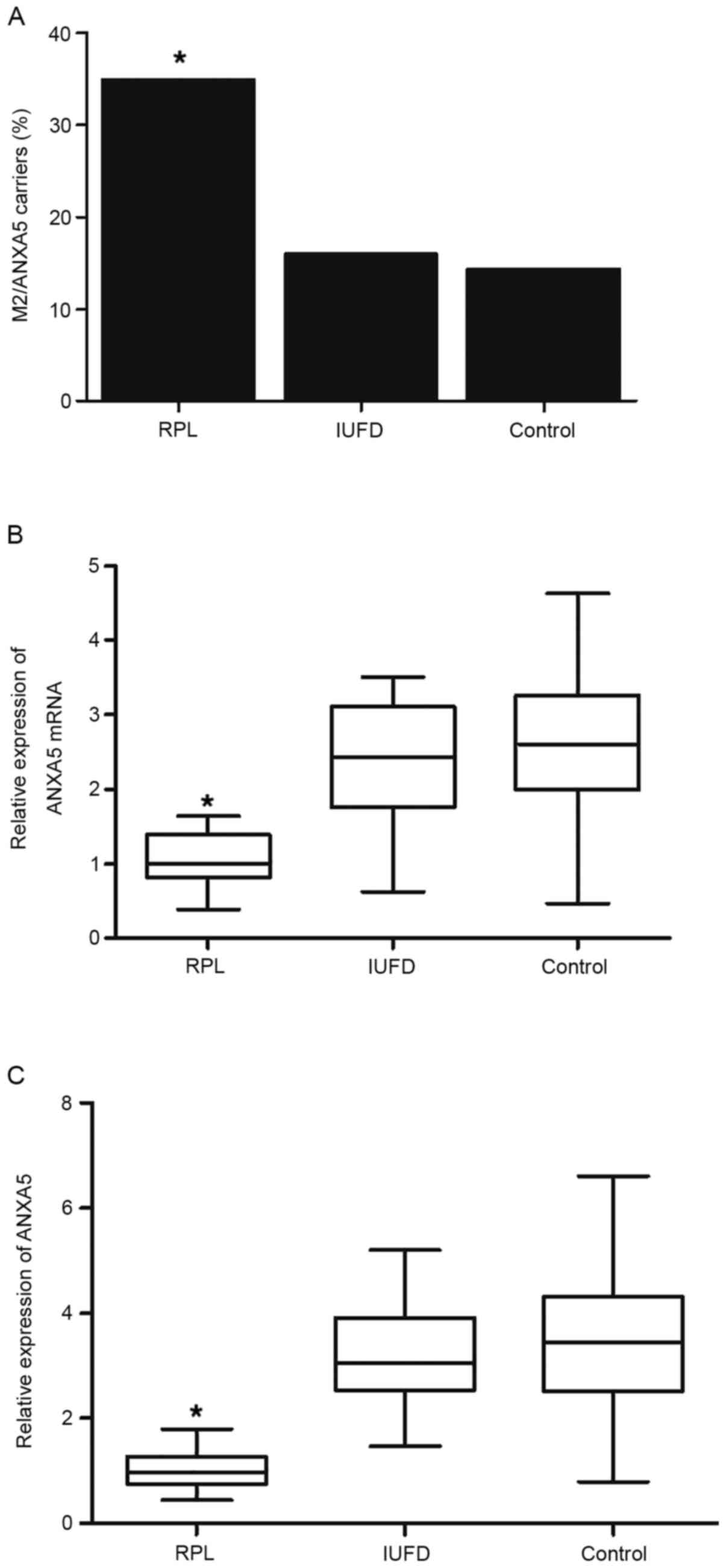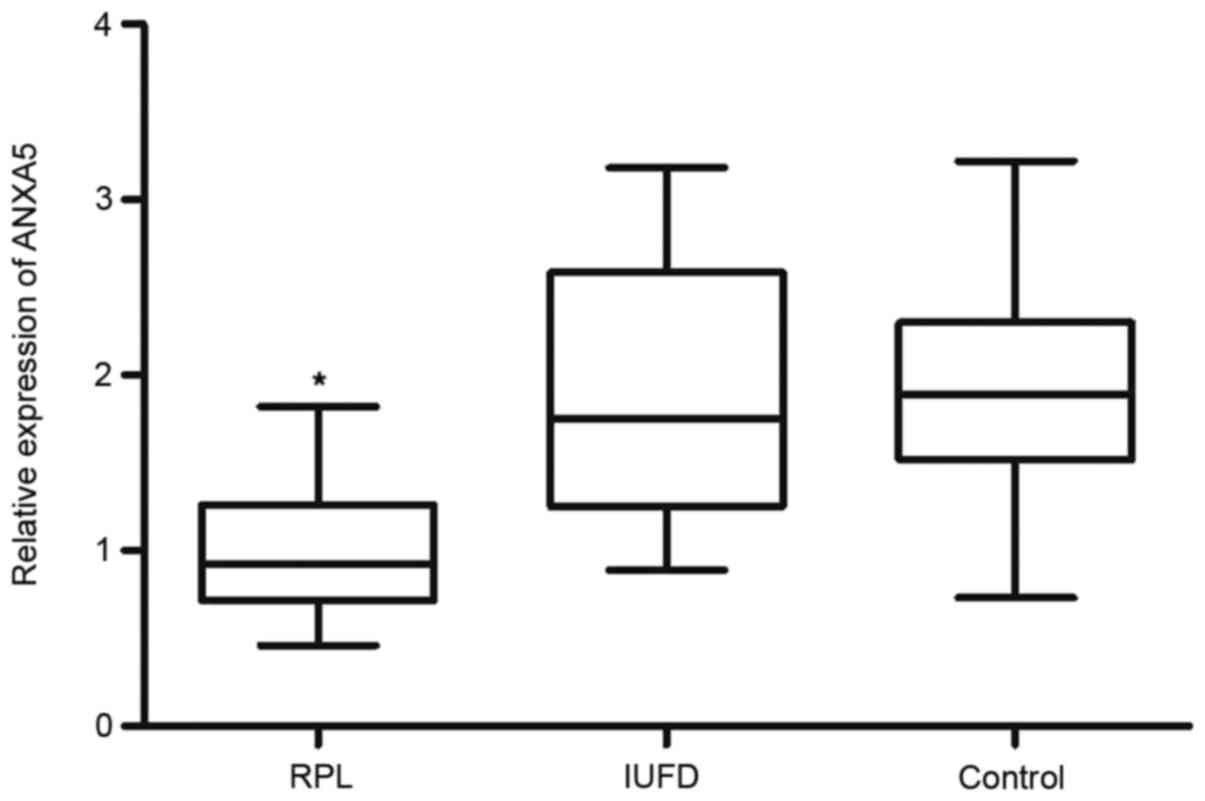|
1
|
Rasmark Roepke E, Christiansen OB and
Hansson SR: Reliability of recurrent pregnancy loss diagnosis
coding in the Swedish National Patient Register: A validation
study. Clin Epidemiol. 11:375–381. 2019. View Article : Google Scholar : PubMed/NCBI
|
|
2
|
Larsen EC, Christiansen OB, Kolte AM and
Macklon N: New insights into mechanisms behind miscarriage. BMC
Med. 11:1542013. View Article : Google Scholar : PubMed/NCBI
|
|
3
|
Practice Committee of American Society for
Reproductive Medicine, . Definitions of infertility and recurrent
pregnancy loss. Fertil Steril. 90 (Suppl 5):S602008. View Article : Google Scholar : PubMed/NCBI
|
|
4
|
Practice Committee of the American Society
for Reproductive Medicine, . Evaluation and treatment of recurrent
pregnancy loss: A committee opinion. Fertil Steril. 98:1103–1111.
2012. View Article : Google Scholar : PubMed/NCBI
|
|
5
|
McQueen DB, Bernardi LA and Stephenson MD:
Chronic endometritis in women with recurrent early pregnancy loss
and/or fetal demise. Fertil Steril. 101:1026–1030. 2014. View Article : Google Scholar : PubMed/NCBI
|
|
6
|
Ueki H, Mizushina T, Laoharatchatathanin
T, Terashima R, Nishimura Y, Rieanrakwong D, Yonezawa T, Kurusu S,
Hasegawa Y, Brachvogel B, et al: Loss of maternal Annexin A5
increases the likelihood of placental platelet thrombosis and
foetal loss. Sci Rep. 2:8272012. View Article : Google Scholar : PubMed/NCBI
|
|
7
|
Markoff A, Gerdes S, Feldner S, Bogdanova
N, Gerke V and Grandone E: Reduced allele specific annexin A5 mRNA
levels in placentas carrying the M2/ANXA5 allele. Placenta.
31:937–940. 2010. View Article : Google Scholar : PubMed/NCBI
|
|
8
|
Rand JH and Wu XX: Antibody-mediated
interference with annexins in the antiphospholipid syndrome. Thromb
Res. 114:383–389. 2004. View Article : Google Scholar : PubMed/NCBI
|
|
9
|
Bouter A, Carmeille R, Gounou C, Bouvet F,
Degrelle SA, Evain-Brion D and Brisson AR: Review: Annexin-A5 and
cell membrane repair. Placenta. 36 (Suppl 1):S43–S49. 2015.
View Article : Google Scholar : PubMed/NCBI
|
|
10
|
Bogdanova N, Horst J, Chlystun M, Croucher
PJ, Nebel A, Bohring A, Todorova A, Schreiber S, Gerke V, Krawczak
M and Markoff A: A common haplotype of the annexin A5 (ANXA5) gene
promoter is associated with recurrent pregnancy loss. Hum Mol
Genet. 16:573–578. 2007. View Article : Google Scholar : PubMed/NCBI
|
|
11
|
Rogenhofer N, Engels L, Bogdanova N,
Tüttelmann F, Markoff A and Thaler CJ: The haplotype M2 of the
ANXA5 gene is not associated with antitrophoblast antibodies. J
Assist Reprod Genet. 30:711–716. 2013. View Article : Google Scholar : PubMed/NCBI
|
|
12
|
Carcedo MT, Iglesias JM, Bances P, Morgan
RO and Fernandez MP: Functional analysis of the human annexin A5
gene promoter: A downstream DNA element and an upstream long
terminal repeat regulate transcription. Biochem J. 356:571–579.
2001. View Article : Google Scholar : PubMed/NCBI
|
|
13
|
Wang Y, Liu HZ, Liu Y, Wang HJ, Pang WW
and Zhang JJ: Downregulated MALAT1 relates to recurrent pregnancy
loss via sponging miRNAs. Kaohsiung J Med Sci. 34:503–510. 2018.
View Article : Google Scholar : PubMed/NCBI
|
|
14
|
Livak KJ and Schmittgen TD: Analysis of
relative gene expression data using real-time quantitative PCR and
the 2(-Delta Delta C(T)) method. Methods. 25:402–408. 2001.
View Article : Google Scholar : PubMed/NCBI
|
|
15
|
Gerke V, Creutz CE and Moss SE: Annexins:
Linking Ca2+ signalling to membrane dynamics. Nat Rev Mol Cell
Biol. 6:449–461. 2005. View
Article : Google Scholar : PubMed/NCBI
|
|
16
|
Kutteh WH and Hinote CD: Antiphospholipid
antibody syndrome. Obstet Gynecol Clin North Am. 41:113–132. 2014.
View Article : Google Scholar : PubMed/NCBI
|
|
17
|
Kutteh WH: Antiphospholipid antibody
syndrome and reproduction. Curr Opin Obstet Gynecol. 26:260–265.
2014. View Article : Google Scholar : PubMed/NCBI
|
|
18
|
Rand JH, Arslan AA, Wu XX, Wein R,
Mulholland J, Shah M, van Heerde WL, Reutelingsperger CP, Lockwood
CJ and Kuczynski E: Reduction of circulating annexin A5 levels and
resistance to annexin A5 anticoagulant activity in women with
recurrent spontaneous pregnancy losses. Am J Obstet Gynecol.
194:182–188. 2006. View Article : Google Scholar : PubMed/NCBI
|
|
19
|
Dahm AE, Tiscia G, Holmgren A, Jacobsen
AF, Skretting G, Grandone E and Sandset PM: Genetic variations in
the annexin A5 gene and the risk of pregnancy-related venous
thrombosis. J Thromb Haemost. 13:409–413. 2015. View Article : Google Scholar : PubMed/NCBI
|
|
20
|
de Jong PG, Hiddink L, Meijers JC,
Kiemeney LA, van Heerde WL and Middeldorp S: No association between
Annexin A5 genetic variants and deep venous thrombosis. Br J
Haematol. 169:301–304. 2015. View Article : Google Scholar : PubMed/NCBI
|
|
21
|
Tiscia G, Colaizzo D, Chinni E, Pisanelli
D, Sciannamè N, Favuzzi G, Margaglione M and Grandone E: Haplotype
M2 in the annexin A5 (ANXA5) gene and the occurrence of obstetric
complications. Thromb Haemost. 102:309–313. 2009. View Article : Google Scholar : PubMed/NCBI
|
|
22
|
Grandone E, Tiscia G, Colaizzo D, Chinni
E, Pisanelli D, Bafunno V and Margaglione M: Role of the M2
haplotype within the annexin A5 gene in the occurrence of
pregnancy-related venous thromboembolism. Am J Obstet Gynecol.
203:461.e1–e5. 2010. View Article : Google Scholar : PubMed/NCBI
|
|
23
|
Miyamura H, Nishizawa H, Ota S, Suzuki M,
Inagaki A, Egusa H, Nishiyama S, Kato T, Pryor-Koishi K, Nakanishi
I, et al: Polymorphisms in the annexin A5 gene promoter in Japanese
women with recurrent pregnancy loss. Mol Hum Reprod. 17:447–452.
2011. View Article : Google Scholar : PubMed/NCBI
|
|
24
|
de Laat B, Wu XX, van Lummel M, Derksen
RH, de Groot PG and Rand JH: Correlation between antiphospholipid
antibodies that recognize domain I of beta2-glycoprotein I and a
reduction in the anticoagulant activity of annexin A5. Blood.
109:1490–1494. 2007. View Article : Google Scholar : PubMed/NCBI
|
|
25
|
Rai R, Tuddenham E, Backos M, Jivraj S,
El'Gaddal S, Choy S, Cork B and Regan L: Thromboelastography,
whole-blood haemostasis and recurrent miscarriage. Hum Reprod.
18:2540–2543. 2003. View Article : Google Scholar : PubMed/NCBI
|
|
26
|
Romagnuolo I, Attanasio M, Cozzolino M,
Paladino E, Castaman G, Coccia ME and Fatini C: Thrombin potential
and traditional coagulation assay: Are they useful in exploring
recurrent pregnancy loss risk? Blood Coagul Fibrinolysis.
29:160–166. 2018. View Article : Google Scholar : PubMed/NCBI
|
|
27
|
Hiddink L, de Visser MC and van Heerde WL:
Polymorphisms in the Annexin A5 gene influence circulating Annexin
A5 levels in healthy controls. Thromb Res. 129:815–817. 2012.
View Article : Google Scholar : PubMed/NCBI
|
|
28
|
Tüttelmann F, Ivanov P, Dietzel C,
Sofroniou A, Tsvyatkovska TM, Komsa-Penkova RS, Markoff A, Wieacker
P and Bogdanova N: Further insights into the role of the annexin A5
M2 haplotype as recurrent pregnancy loss factor, assessing timing
of miscarriage and partner risk. Fertil Steril. 100:1321–1325.
2013. View Article : Google Scholar : PubMed/NCBI
|
|
29
|
Tiscia G, Colaizzo D, Favuzzi G, Vergura
P, Martinelli P, Margaglione M and Grandone E: The M2 haplotype in
the ANXA5 gene is an independent risk factor for idiopathic
small-for-gestational age newborns. Mol Hum Reprod. 18:510–513.
2012. View Article : Google Scholar : PubMed/NCBI
|
|
30
|
Chinni E, Tiscia GL, Colaizzo D, Vergura
P, Margaglione M and Grandone E: Annexin V expression in human
placenta is influenced by the carriership of the common haplotype
M2. Fertil Steril. 91:940–942. 2009. View Article : Google Scholar : PubMed/NCBI
|
|
31
|
Lan Y, Wang J, Zhang Q, Yang X, Li L, Yin
J, Li H, Song X, Chen Z and Liu Y: Genetic variations and
haplotypes in the annexin A5 gene are associated with the risk of
recurrent pregnancy loss. J Cell Physiol. 234:18308–18316. 2019.
View Article : Google Scholar : PubMed/NCBI
|


















